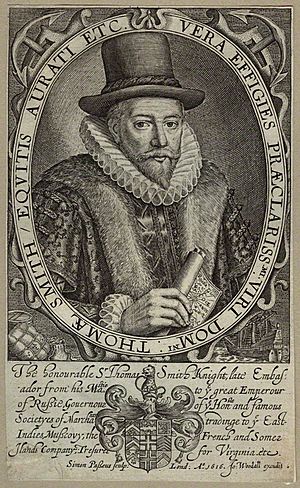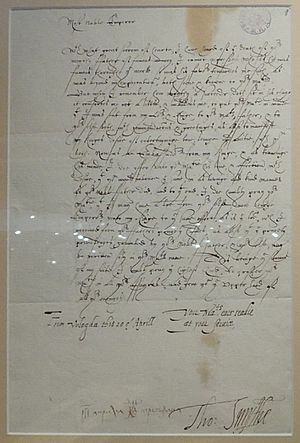Thomas Smythe facts for kids
Quick facts for kids
Sir Thomas Smythe
|
|
|---|---|
 |
|
| Born | c. 1558 |
| Died | 4 September 1625 (aged 66–67) Sutton-at-Hone, Kent
|
| Nationality | English |
| Occupation | Merchant, politician, colonial administrator |
| Known for | Governor of the East India Company |
| Spouse(s) | Sarah Blount |
| Children | 4 |
| Parent(s) | Thomas "Customer" Smythe and Alice Judde |
Sir Thomas Smythe (born around 1558, died September 4, 1625) was an important English merchant, politician, and leader in setting up colonies. He was the very first governor of the East India Company. He also managed the Virginia Company from 1609 to 1620.
Contents
Early Life and Education
Thomas Smythe was the second son of Thomas "Customer" Smythe. His father was a successful merchant who worked in London. Thomas Smythe's grandfather, Sir Andrew Judde, was also a famous London merchant and even a Lord Mayor.
Young Thomas Smythe grew up learning about business from his family. He went to Merchant Taylors' School in 1571. This education helped him prepare for his future career.
Business and Political Career
In 1580, Thomas Smythe joined two important trade groups: the Worshipful Company of Haberdashers and the Worshipful Company of Skinners. He quickly became very wealthy and well-known. He also started to get involved in politics.
Early Public Roles
Smythe held several important positions in London. From 1597 to 1598, he was an auditor for the City of London. He also served as the treasurer for St Bartholomew's Hospital from 1597 to 1601. In 1597, he was briefly elected to Parliament for Aylesbury. In 1599, he became an alderman and one of the two sheriffs of the City of London for the year 1600.
Supporting Trade and Exploration
Thomas Smythe helped fund many trade trips and voyages of exploration. These trips happened in the late 1500s and early 1600s. In 1592, he gained rights to help settle the Colony of Virginia from Sir Walter Raleigh.
When the East India Company was created in October 1600, Smythe was chosen as its first governor. This was a very important role. He held this position for about four months.
Challenges and Royal Support
In 1601, while serving as London's sheriff, Smythe faced a difficult situation. He was suspected of supporting the Earl of Essex during a rebellion. Smythe was briefly held in the Tower of London. However, he was released when Queen Elizabeth I died in 1603.
After King James I became king, Smythe was knighted on May 13, 1603. This meant he was given the title "Sir." Later that year, he was re-elected to Parliament for Dunwich.
Leading Major Companies
In 1603, Smythe was again elected governor of the East India Company. He kept this role until 1621, with only a short break. During his time as governor, the company started trading with India.
In 1604, Smythe was appointed to help manage the Duchy of Cornwall. He also became a special ambassador to the Russian Tsar Boris Godunov. Smythe was involved in the Muscovy trade, just like his grandfather, Sir Andrew Judde. He traveled to Russia and helped get new trading rights for the company.
In 1609, Smythe helped get a special royal document for the London Virginia Company. He became the treasurer for this new colony. This meant he was the main leader from England. He managed the colony until 1620. During this time, he focused on expanding the tobacco crop.
Later Career and Investigations
In 1620, Smythe faced questions about how he managed the Virginia Company's money. King James I later took back the colony's charter in 1624. This made Virginia a royal colony, directly controlled by the king. Even though Smythe was partly blamed, he kept the king's support.
Some members of Parliament, like Nicholas Ferrar and Edwin Sandys, wanted a deeper investigation into the company's finances. This investigation continued until Smythe's death in 1625. Despite the questions, the king's officials still asked Smythe for advice on shipping and trade.
For several years, Smythe was a chief commissioner for the navy. He was also an early investor in the Somers Isles Company, which managed Bermuda. He served as the governor of Bermuda from England starting in 1612.
Smythe also supported voyages to find the North-West Passage in North America. William Baffin named Smith Sound after him to honor his support for Baffin's 1616 journey.
Personal Life
Sir Thomas Smythe usually spelled his last name "Smythe." He was married three times. His third wife was Sarah Blount. They had one daughter and three sons.
Death and Legacy
Sir Thomas Smythe passed away at Sutton-at-Hone in Kent on September 4, 1625. He was buried in St John's Church, where a detailed monument was built to remember him.
Smythe became very wealthy during his life. He used a lot of his money to help others. He supported the free school in Tonbridge, which his grandfather, Sir Andrew Judd, had founded. One of the school's houses is still named after him today. He also set up charities to help poor people in Tonbridge.
 | Chris Smalls |
 | Fred Hampton |
 | Ralph Abernathy |


